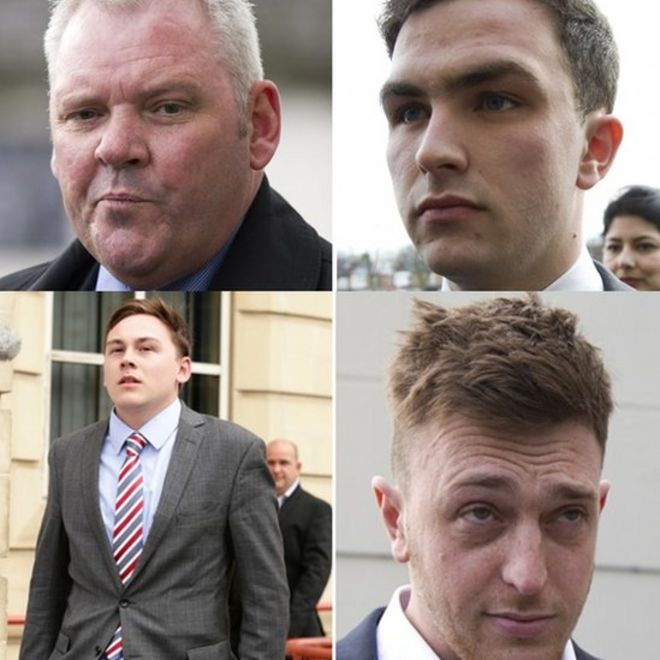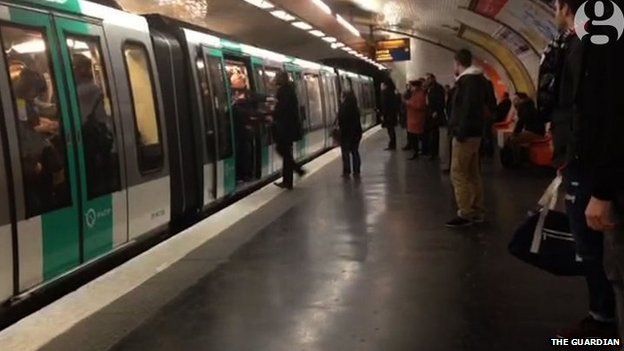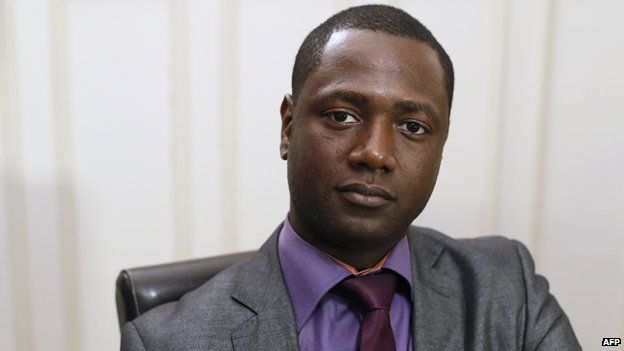
Clockwise from top left: Richard Barklie, Joshua Parsons, Jordan Munday and William Simpson
Four Chelsea fans accused of refusing to allow a black man on to the Paris Metro have been banned from attending football matches for up to five years.
Richard Barklie, from Carrickfergus, Northern Ireland, and Joshua Parsons and William Simpson, both from Surrey, were banned for five years at Stratford Magistrates’ Court.
Jordan Munday, from Sidcup in Kent, was banned for three years.
They were told they could not attend games at home or abroad.
District Judge Gareth Branston said: “Racist hatred was displayed by Chelsea fans on the Paris Metro that evening.”

The Paris Metro incident was caught on camera
He told the court what happened had “tarnished the reputation of English football in Europe”.
Violence flared when Chelsea fans were in the French capital to watch the west London club’s Champions League match against Paris St-Germain on 17 February.
Afterwards video surfaced showing Frenchman Souleymane Sylla pushed off the train amid chants of “we’re racist and that’s the way we like it”.
The French commuter previously said the whole episode was “humiliating”.

Souleymane Sylla described the episode as “humiliating”
In a statement read out in court, Mr Sylla said he was “violently” forced off the train as Chelsea fans jeered at him.
He said: “I again approached the carriage, explaining to this person I wanted to get back on the train.
“He didn’t seem to understand what I said to him, and other supporters behind him were shouting and singing in English. As I don’t speak English, I didn’t understand what they said.”
“Another person made a sign indicating to the colour of the skin on his face,” he said.
Barklie, 50, of Victoria Street in Carrickfergus, a director with the World Human Rights Forum, had admitted twice pushing Mr Sylla, but blamed the Parisian for using “aggression” and shouting.
What are football banning orders?
- Banning orders are a civil rather than criminal sanction designed to prevent future trouble rather than penalise past behaviour
- For an order to be issued, it must be proved that the accused person has caused or contributed to football-related violence or disorder
- Banning orders can last for between three and 10 years and were first introduced by the Football (Offences and Disorder) Act 1999
- Individuals can also be banned from using public transport on match days and from visiting other potential violent “hotspots” such as town centres, certain pubs and bars
- Breach of an order is a criminal offence and punishable by a maximum sentence of six months in prison
Sources: Gov.co.uk and In Brief
The judge, however, said Barklie, a former policeman, “proved to be a menace” and had “demonstrated aggressive, disorderly conduct”.
He said Parsons played a leading role too and displayed “aggressive and disorderly conduct as part of a pack of Chelsea fans”.
It was heard Parsons later lost his job at a Mayfair financial company as a result of his involvement.
Another Chelsea supporter, Dean Callis, 32, of Liverpool Road, Islington, received a five-year banning order ahead of the court hearing for a number of incidents, including the one in Paris, Scotland Yard confirmed.

The match was a 1-1 draw, with PSG winning on away goals after the second leg in London
Speaking outside court, Barklie said he was considering appealing against the judge’s decision.
He said: “I am surprised that the judge has disregarded the evidence of the person best placed to see what happened on that train – Mr Sylla.
“Mr Sylla’s statements to the French police made clear that I was not involved in any racist activity.”
The Met Police said there were 224 people in their area who were subject to football banning orders preventing them from attending any designated football matches in the UK or abroad.
Ch Supt Colin Morgan said: “Violence and racism have no place in football and we will continue to put offenders before the courts as part of our efforts to make football a safer environment for everyone.”
BBC Sport
 Q FM Africa's Modern Radio
Q FM Africa's Modern Radio